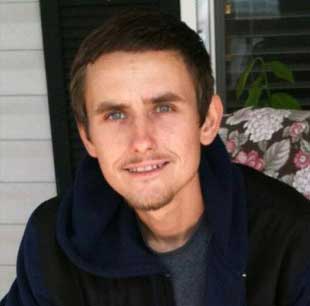“Asbestos does not think, it just kills”
Michael Bradley grew up in Georgia but as a teenager he lived for a time with his father Randy in South Carolina. Sometimes he tagged along to the dump where his father worked, playing on the landfill or fishing on the property. His parents had divorced when Michael was young, so it was a treasured time to ride in his father’s truck, talk to him about sports and hug him when he came home from work.
Michael Bradley grew up in Georgia but as a teenager he lived for a time with his father Randy in South Carolina. Sometimes he tagged along to the dump where his father worked, playing on the landfill or fishing on the property. His parents had divorced when Michael was young, so it was a treasured time to ride in his father’s truck, talk to him about sports and hug him wh...
 Michael Bradley grew up in Georgia but as a teenager he lived for a time with his father Randy in South Carolina. Sometimes he tagged along to the dump where his father worked, playing on the landfill or fishing on the property. His parents had divorced when Michael was young, so it was a treasured time to ride in his father’s truck, talk to him about sports and hug him when he came home from work.
Michael Bradley grew up in Georgia but as a teenager he lived for a time with his father Randy in South Carolina. Sometimes he tagged along to the dump where his father worked, playing on the landfill or fishing on the property. His parents had divorced when Michael was young, so it was a treasured time to ride in his father’s truck, talk to him about sports and hug him when he came home from work.
The hugs turned out to be deadly.
At age 27 Michael was working at his mother and stepfather’s printing supply business in Atlanta. He was a heavy young man, and his mother, Sandy Neuenschwander, promised she’d get him a passport if he lost 50 pounds. He had lost 70 pounds when the family noticed that his stomach was not shrinking like the rest of his body. As he began to have trouble with his bowels, his mother thought he had Crohn’s disease, a chronic intestinal inflammation from which she suffers and which tends to run in families.
She took him to her doctor, a gastrointestinal specialist, but since Michael lacked health insurance, she couldn’t afford the $6,000 tests for Crohn’s. When his pain became excruciating, she took him to the emergency room, where a CAT scan revealed a huge mass in his abdomen. A sample was sent to the Mayo Clinic in Minnesota for testing.
On Valentine’s Day in 2012, they received the diagnosis: Michael had peritoneal mesothelioma, a rare and incurable cancer that is almost always caused by exposure to asbestos. But how was he exposed?
His family learned that the North Carolina landfill was a disposal site for asbestos waste, and the workers didn’t always wear protective clothing. Michael, it turned out, was one of a new generation of asbestos victims who were not exposed on the job or by handling products made with asbestos but simply by contact with family members.
Without surgery, the doctors said, Michael had three weeks to live – with surgery, three months. He opted for the surgery, and on March 9, 2012, doctors removed a tumor more than a foot wide.
“I felt utterly hopeless, knowing there was nothing I could do to help him,” said Sandy Neuenschwander. “Each surgery and round of chemotherapy left Michael weaker, and he was in constant pain. He used to tell us he wanted to die.”
But he defied the odds.
Over the next two years, Michael lost more than 150 pounds. When the medical bills and other expenses drove his family into bankruptcy, they sold their home and moved to a rural community in northern Georgia so that Michael could spend the rest of his life in the country, where he’d always wanted to live. Toward the end, he endured a 14-hour trip to the National Institutes of Health in Bethesda, Md., to take part in a clinical trial for an experimental drug. But he developed antibodies to the drug and had to drop out of the trial.
During his final months, Michael contacted the Asbestos Disease Awareness Organization, an advocacy group that works toward a global ban on asbestos and for funding to seek a cure. Bedridden, he spent much of his time writing letters and making phone calls for the cause. In a post for the organization’s website, he wrote: “Asbestos is deadly. It does not think, it just kills.”
In February 2014, Michael received the Asbestos Disease Awareness Organization’s Special Recognition of Valor Award. Dr. Richard Lemen, a former U.S. assistant surgeon general and co-chair of the organization’s Science Advisory Board, sent him a message: “Since we have no cure for your disease nor have we eliminated the use of asbestos, the sharing of your experiences for other asbestos-related disease victims constitutes some of the best medicine they can receive because they know they are not alone. It takes a brave and courageous man to open up his life and share as you have.”
Less than three months later, on April 24, 2014, Michael Bradley died at home in Tunnel Hill, Ga. He was 29 years old.
The Neuenschwanders have filed a wrongful death lawsuit against the owners and operators of the landfill where Michael’s father worked. Trial is pending, but no matter the outcome, his mother will not stop working to fulfill Michael’s dying wish: to share his story in hopes that the government will come to understand the horror and tragedy of asbestos and ban it.
“Michael had his whole life ahead of him,” she said. “We will never get to see him get married, never get to see him experience the miracle of starting his own family, and we’ll never get to hug him again or look into his eyes while he says, ‘Mama, I love you’. It’s time for Congress, both Republicans and Democrats together, to come together and ban asbestos – for Michael, for our family and for the hundreds of thousands of other mothers out there who should not have to watch their sons die a horrible and preventable death.”






